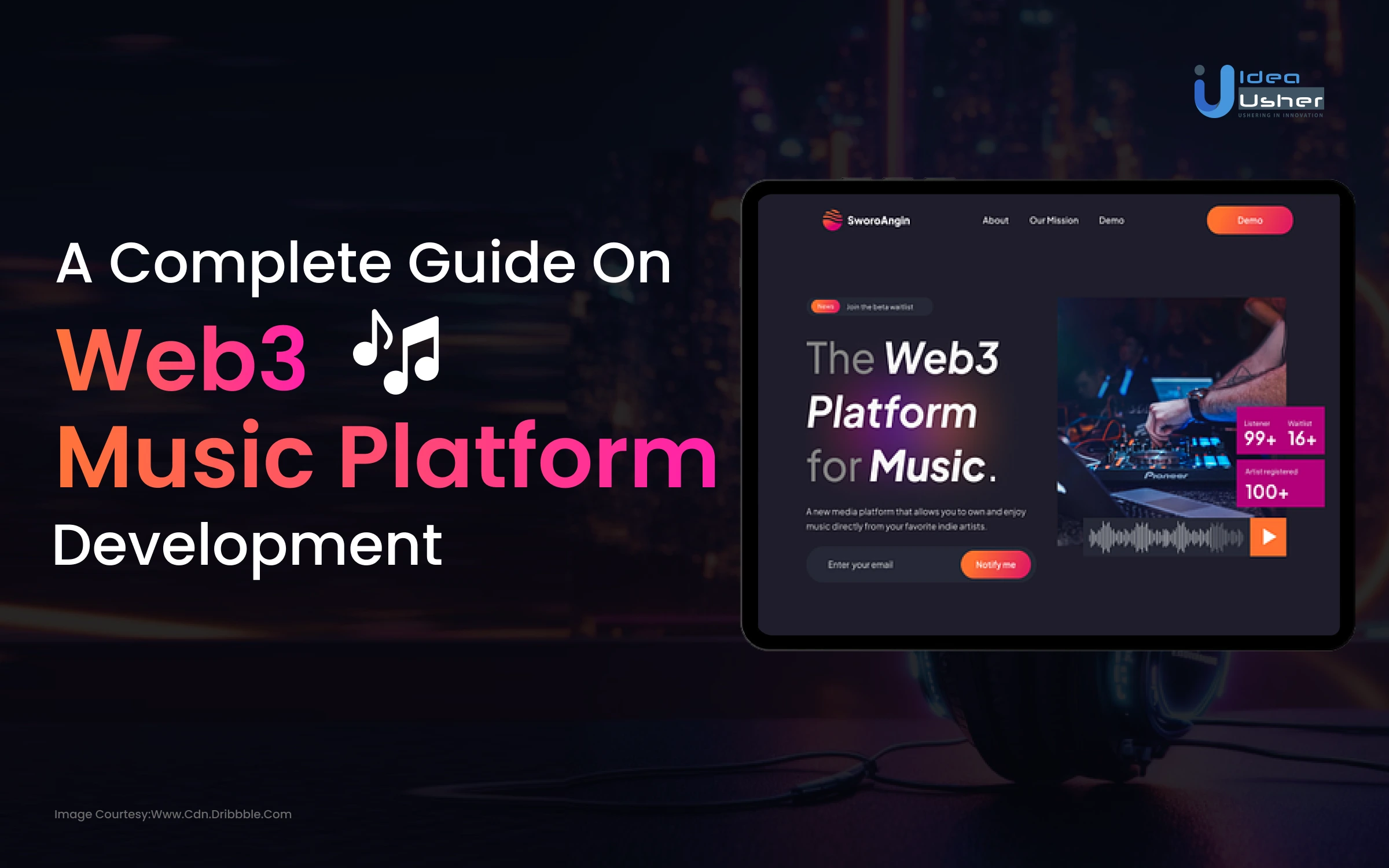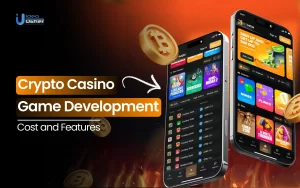The emergence of Web3 technology has revolutionized many industries, and the music industry is not left behind.
Integrating Web3 into music platforms has taken the music industry by storm, where musicians can explore a new way to share music and earn in different ways, such as cryptocurrencies and NFTs.
Web3 music platform increases peer-to-peer transactions, as its decentralized nature helps artists to fully own their content by removing middlemen.
Moreover, businesses seeking web3 music platform development can offer enhanced customer experience by bringing transparency and ownership to the music industry.
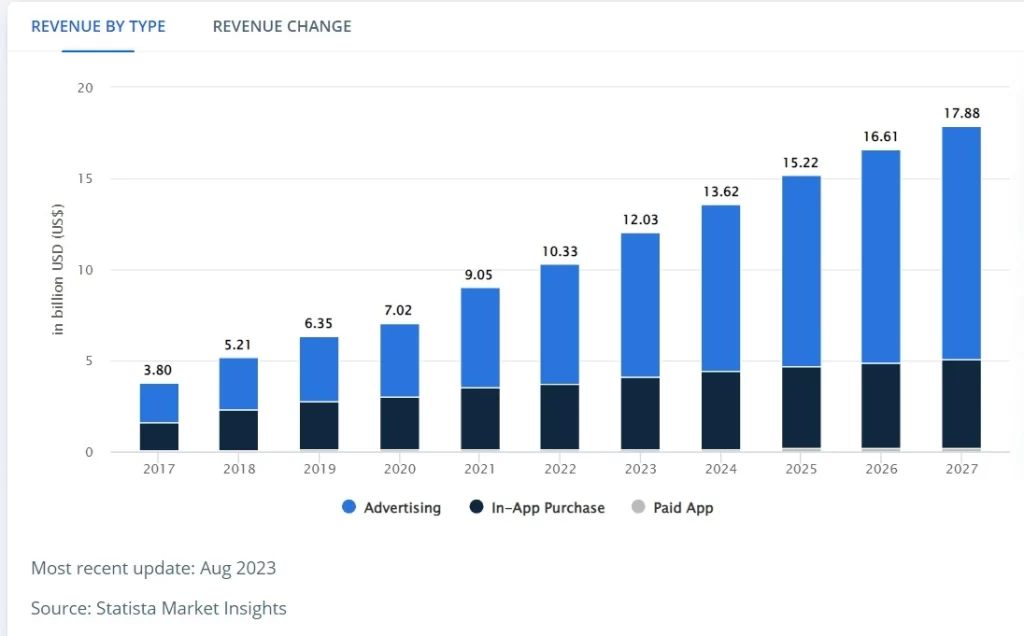
Source: Statista
In this blog, we will explore how to connect Web 3 with music and user communities through the underlying technologies and features that drive them.
What Is Web3 Music Streaming Platform?
A decentralized place where musicians can sell their music and generate revenue for artists and listeners. A Web3 music streaming platform is a digital music service that leverages blockchain technology to build a more fair, transparent, and user-centric ecosystem for music enthusiasts and artists.
Blockchain music platforms can offer enhanced transparency and fairness to their music community by eliminating intermediaries & allowing artists to connect directly with their audience.
With efficient rights management and smart contracts, Web3 music app development enables artists to ensure they will receive timely and accurate royalty payments.
This decentralized approach ensures that artists receive a fair share of revenue and have greater control over their creative work, fostering a more reliable music ecosystem.
Moreover, the immutable nature of blockchain technology in the music platform simplifies the complex processes and reduces disputes involved in music licensing and distribution.
Furthermore, Web3 music apps leverage the power of community engagement through tokenization.
Also, a decentralized music platform creates a stronger bond between artists and their audiences, where users can directly support their favorite artists by participating in crowdfunding campaigns or purchasing tokens.
How Web 3 Music Platform Works?
A web3 music platform uses blockchain technology to revolutionize how music is created, shared, and monetized.
Eliminating intermediaries by integrating blockchain technology and smart contracts revolutionizes the traditional music industry in various ways.
Here are the workings of the Web 3 music platform:
1. Blockchain Technology
A distributed ledger containing records of all transactions in transparent and immutable, which enables the platform to ensure trust, security, and transparency in the platform’s operations.
2. NFTs (Non-Fungible Tokens)
NFT represent individual songs, albums, or other music-related content. Each NFT is associated with a specific music and includes metadata about content such as artist information, copyright details, and royalties.
3. Smart Contracts
Artists can ensure they are fairly compensated for their work through smart contracts. Smart contracts in a Web 3 music platform automate various processes, such as royalty distribution, copyright enforcement, and content licensing.
4. Content Upload and Verification
Artists or creators upload their music to the platform, where the Web 3 music platform prevents plagiarism and copyright infringement by verifying ownership and authenticity through a consensus mechanism involving the community or stakeholders.
5. Royalty Distribution
Artists can instantly ensure they receive their fair share by managing royalty distribution powered by smart contracts. Also, smart contracts divide the revenue among the relevant parties, typically the artist, songwriters, producers, and other stakeholders
6. Music Marketplace
Web 3 music platform includes a marketplace where users can discover and purchase music using cryptocurrencies. NFTs in the music space represent songs or albums, which grants them ownership and access to the content.
7. Decentralization and Transparency
The Blockchain network makes music content resistant to censorship and single points of failure. Decentralization is a key feature of Web3 music platforms where content is not stored on a single server but distributed across the blockchain network.
8. Cryptocurrency Integration
Users may require crypto wallets to manage their digital assets, enabling them to participate in the platform where users need to use cryptocurrencies like Ether (ETH) for Ethereum-based blockchain platforms or platform-specific tokens
Must-Have Features For Web3 Music App
Musicians or artists can upload and sell their music and earn crypto without any middlemen with the web3 streaming platform features, allowing listeners to access multiple music without intermediaries.
Here are some of the must-have features of web3 music application development:
1. Peer-to-Peer Sharing
Peer-to-peer (P2P) networks eliminate the requirement for intermediaries, allowing faster and more efficient sharing of music where users can directly share music files with each other.
2. Smart Contract Development
Businesses can enable transparent and automatic royalty payments and licensing agreements through smart contract development solutions.
Moreover, artists can specify their music usage terms and conditions. Whenever the music is played or sold, platform owners can ensure the appropriate payments are made to the rights holders
3. Decentralized Storage
With decentralized storage systems, such as IPFS (InterPlanetary File System), platform owners can ensure the files resist censorship, tampering, and single points of failure by distributing files across multiple nodes.
4. Tokenized Ecosystem
Blockchain standards like ERC-20 or ERC-721, facilitating token development, can be used for different purposes, such as voting on platform governance, accessing exclusive content, and rewarding community participation.
5. Interoperability And Collaboration
Decentralization enables seamless sharing and collaboration across the decentralized web through blockchain-based protocols and standards, simplifying integration and interaction with various platforms.
Moreover, there is easier collaboration among artists, producers, and other stakeholders in the music ecosystem through easier Web3 music apps.
6. Crypto Wallet Integration
Blockchain wallet enables musicians and listeners to store their digital assets and cryptocurrency in such wallets as the transaction can be done with cryptocurrency on such platforms.
Benefits Of Web3 Music Application Development
Music artists and users can experience many benefits of Web3 music application compared to traditional music streaming platforms, such as:
1. Crowdfunding
Users can pay musicians for music creation, allowing users to crowdfund the idea, and artists can profit from it in cryptocurrency.
Artists can build a more personal and loyal fan base, fostering stronger artist-fan relationships where fans can feel a sense of ownership and involvement in the creative process.
Moreover, artists can have creative control and freedom to experiment with music and fund their projects without relying on traditional record labels.
2. Direct Feedback
Web3 music app development brings awareness among musicians and listeners.
Artists can enhance their music by gathering feedback directly from their audience, allowing artists to tailor their music and content to suit the preferences of their fans better.
3. Sell Music As NFTs
Artists can experiment with new business models where they can explore crowdfunding and direct-to-fan sales and can offer unique experiences to their audience, encouraging creativity and entrepreneurship within the music industry.
Moreover, the Web 3 music platform offers an excellent opportunity for creators to earn royalties for their work without any intermediaries, as these platforms allow users to sell their music albums as NFTs.
4. Ownership
Music artists can ensure they own the album and protect their intellectual property, where they can use non-fungible tokens (NFTs) to represent ownership and authenticity of their music content.
NFTs give music artists more control over their intellectual property. They can access unique revenue streams, such as NFT sales, giving them ownership and the right to distribute their music albums.
5. Transparency
The Web3 music platform offers excellent transparency, reducing fraud and improving trust among artists and users.
Decentralized music platform enables users to ensure that their transactions and digital assets are safe and secure on such platforms as blockchain technology can be used to record and securely manage music content, royalties, and transactions.
Monetization Options For Web3 Music Platform
Web3, a music platform development, facilitates a great business model by offering different monetization options. Businesses can generate revenue by developing Web 3 music platforms in the following ways:
1. NFT Marketplace
The platform can generate revenue as a transaction fee on each buying and selling of the NFTs, which resembles NFT marketplace development. NFT can charge a fee from musicians for minting their records, as this will enable musicians to sell their art.
2. Marketplace for Music Services
Platform owners can earn a commission from transactions by developing a marketplace where musicians can find and hire services like producers, engineers, graphic designers, and marketers.
3. Video On Demand
Businesses can earn massive income from music albums being listened to by thousands of users. Also, musicians can sell or rent music albums in a secure decentralized network with their Web 3 music platforms.
4. Premium Subscription
Web 3 music platform can charge weekly, monthly, or yearly from users as a premium fee for allowing users to access exclusive content from their favorite musicians.
5. Crowdfunding and Fan Engagement
Fans can support their favorite artists by participating in crowdfunding campaigns where the Web3 music platform can take a percentage of the funds raised by the fans to support their favorite artists.
6. Partnerships and Collaborations
The Web 3 platform can collaborate with artists, music-related companies, and other Web3 projects to create unique user experiences.
Best Web3 Music Platforms
Knowing the best web3 music platforms might benefit you if you want to build your web3 music platform. The following music platform is popular among music lovers, leveraging blockchain technology to enhance their music experience.
1. OPUS
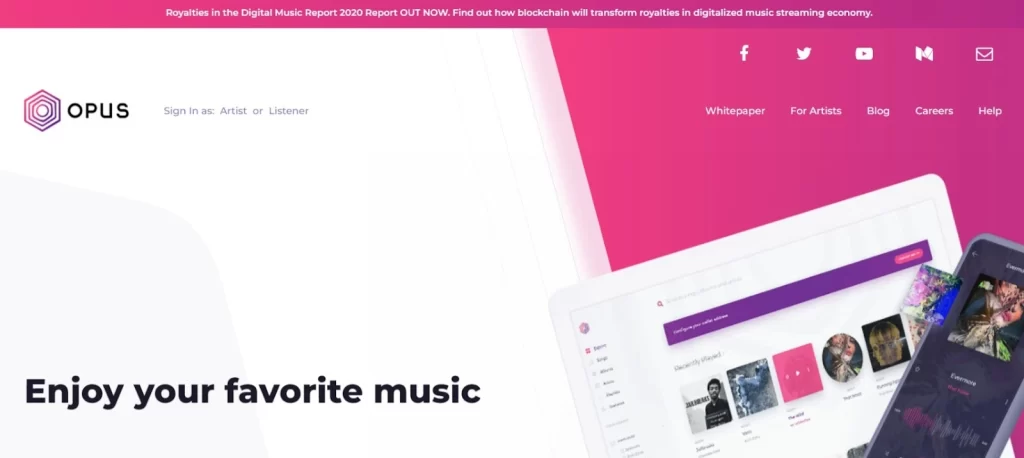
A popular web3 music platform built on the Ethereum blockchain network utilizing an Interplanetary File System (IPFS) for storing and tracking music albums of musicians. IPFS enables OPUS to deliver thousands of tracks per second in a decentralized network.
The decentralized nature of OPUS helps them to cut operational costs, as there is no need for middlemen, allowing fans to earn revenue in crypto, where they can create playlists and distribute music across the platform.
| Launched in | 2018 |
| Founded by | Mateusz Mach |
| Headquarters | London, England, United Kingdom |
| Industry | Bitcoin, Blockchain, Cryptocurrency, Information Technology, Music, Software |
2. Audius Music
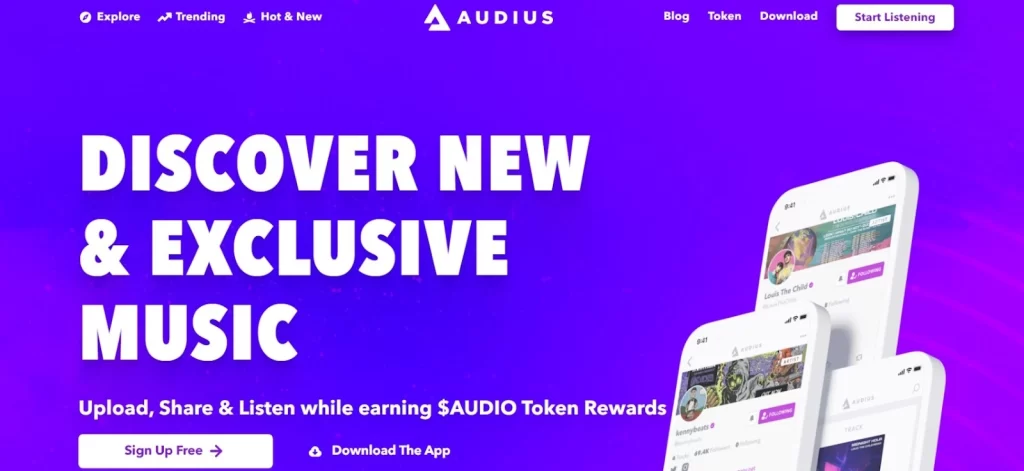
Founded in 2018, Audius Music has recently shifted to the Solana blockchain network from Ethereum. The platform enables artists to upload their music for free and share it with their fans.
Audius doesn’t take a cut from artists’ revenue, unlike centralized music platforms. Moreover, Audisu Music pays 90% of the revenue to musicians through AUDIO cryptocurrency and 10% to their supporters.
| Launched in | 2018 |
| Founded by | Forrest Browning, Ranidu Lankage, Roneil Rumburg |
| Headquarters | San Francisco Bay Area, West Coast, Western USIndustry |
| Industry | Blockchain, Digital Entertainment, Music |
3. BitSong
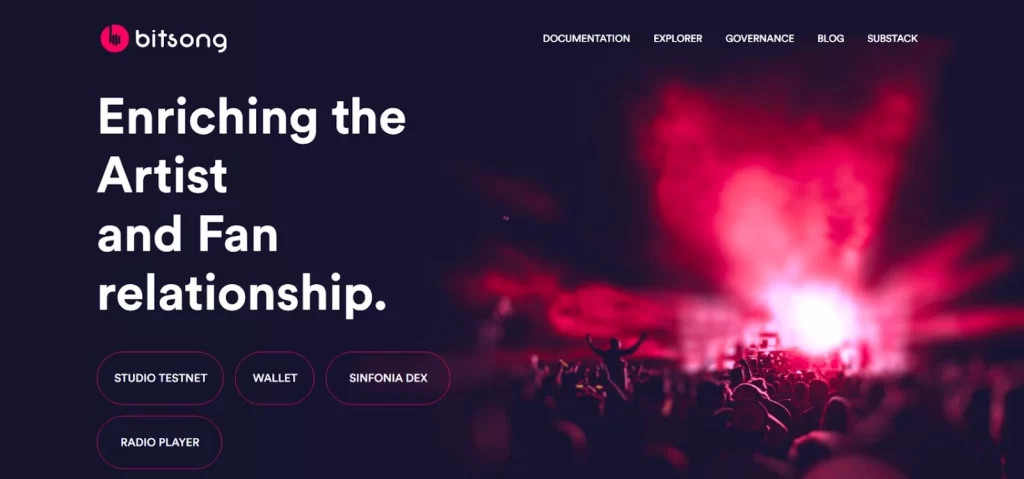
Another best web3 music platform for artists, advertisers, and fans, where 90% of the advertiser’s revenue goes to the fan and artist.
BitSong enables musicians to upload their music attached to an ad. Moreover, fans can donate money to their favorite artists or use it to buy songs on the platform with the BitSong $BTSG token.
| Launched in | 2017 |
| Founded by | Angelo Recca |
| Headquarters | Malta |
| Industry | Blockchain, Music, Music Streaming |
4. Emanate
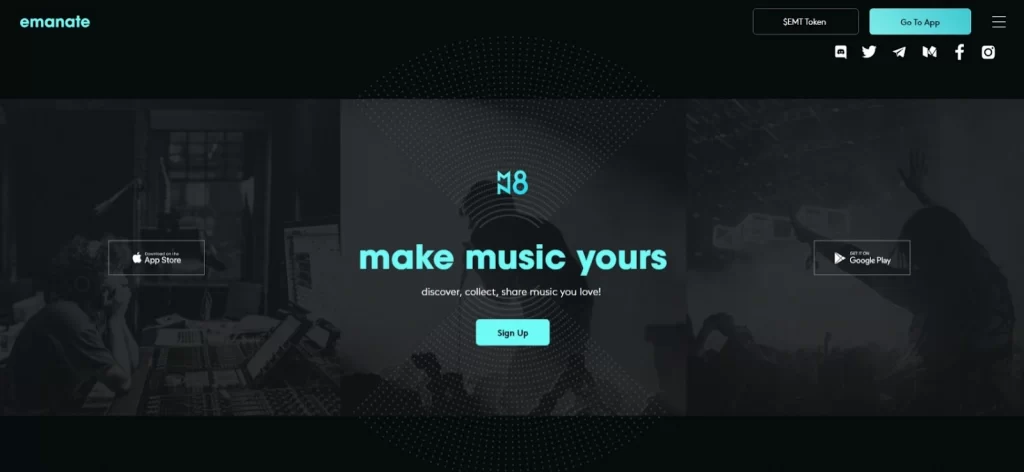
Built on the Ethereum blockchain, Emanate is a web3 music application that lets musicians share their music and monetize their content. The musicians get their rewards in the form of a $EMT token. Moreover, the platform has a music players group for which it costs $6 for users to join the group.
| Launched in | 2017 |
| Founded by | Angelo Recca |
| Headquarters | Sydney, New South Wales, Australia |
| Industry | Cryptocurrency, Marketplace, Music |
Web3 Music Platform Development Steps
From conceptualization to technical implementation, developing a Web3 music platform requires a multidisciplinary team and a deep understanding of the music industry and blockchain technology.
Moreover, it’s essential to stay updated with the rapidly evolving Web3 ecosystem and be adaptable to changes in technology and regulations.
The development steps to build your Web 3 music platform are as follows:
1. Conceptualization and Research
Start conceptualization by studying existing platforms, identifying gaps or opportunities, and understanding the challenges in the music industry that your platform can address.
Also, clearly define your objectives, target audience, and the unique features your Web3 music platform will offer. You can study existing platforms and identify gaps or opportunities in the music industry for excellent research.
2. Create A Development Team
Work with developers, designers, legal experts, and music professionals with expertise in blockchain technology, web development, smart contracts, and music industry knowledge to efficiently facilitate a web three music platform development.
3. Business and Legal Framework
Outline revenue models, fund strategies, and potential partnerships for developing an effective business plan.
Also, you can establish a legal structure for your project and consider issues like copyright, licensing, and compliance with regulations to avoid legal challenges.
4. Choose Blockchain Technology
Deciding which blockchain platform to use for your Web 3-based music platform is crucial where you can choose a suitable blockchain development framework or language.
Binance Smart Chain, Polkadot, or Solana are the best options. However, Ethereum is popular among many developers due to its development community and support.
5. Smart Contract Development
Various aspects of the Web 3 music platform, such as managing royalties, music ownership, and NFT (Non-Fungible Token) creation for music assets, can be managed by smart contracts development.
Moreover, you can rigorously test your smart contracts to ensure the security and functionality of your blockchain-based music platform.
6. Front-end and Back-end Development
Enable artists and users to interact with your platform by developing a user-friendly front-end interface. Consider selecting a simple and plain UI design for the easy navigation of your platform.
Also, implement a robust back-end system for managing the database, user profiles, and interactions to make your music platform fully functional.
7. User Wallet & Blockchain Integration
Offer a seamless onboarding process for users to create and connect their wallets on your music platform. Also allow users to integrate cryptocurrency wallets for managing digital assets, including NFTs and cryptocurrency holdings.
With Blockchain integration, you can ensure that data is stored securely and immutably for processing data storage and transactions.
8. Music Upload and Verification
Develop a system for artists to upload their music and verify ownership. Moreover, implement mechanisms to manage licensing agreements and ensure copyright protection for your Web 3 music platform.
9. Testing & Improvement
Identify and fix vulnerabilities by conducting thorough testing, including security audits and stress testing, and implementing security measures to protect users and their assets.
To improve the Web 3 music platform, include users in the development process and gather feedback. Also, you can scale your platform by developing community-building strategies to attract artists and music enthusiasts.
10. Launch and Marketing
Create a marketing campaign to attract users and artists to your platform by planning a launch strategy and considering initial partnerships with artists or labels to have music content on your platform.
Required Web3 Music Platform Development Tech Stack
Developing a Web 3 blockchain platform requires the combination of decentralized technologies and traditional web development.
Moreover, the choice of specific tools and technologies will depend on the specific Web 3 music platform requirements and goals.
Here are some essential tools for building a Web3 music platform:
1. Blockchain Platform
- Ethereum
- Binance Smart Chain (BSC)
- Solana
2. Smart Contract Development
- Truffle
- Hardhat
- Remix
3. Decentralized Storage
- IPFS (InterPlanetary File System):
- Filecoin
4. Web3 Libraries
- Web3.js
- Ethers.js
- Moralis
5. Identity and Authentication
- UPort
- TheGraph
6. User Wallets
- MetaMask
- Trust Walle
- Fortmatic
7. Payment Gateways
- Coinbase Commerce
- BitPay
- Chainlink VRF (Verifiable Random Function)
8. NFT Standards
- ERC-721
- ERC-1155
- NEP-21
9. Content Delivery Network (CDN)
- Cloudflare
- Akamai
10.Database
- Firebase
- MongoDB
11. Analytics and Monitoring
- Google Analytics
- Mixpanel
- Sentry
12. Security Tools
- OpenZeppelin
- Mythril
- Trail of Bits
13. Community and Communication
- Discord
- Discourse
- Telegram
14. Machine Learning and AI
- TensorFlow
- PyTorch
15. APIs and Integrations
- Web3 APIs
- Social Media APIs
- Music Streaming APIs
Conclusion
By leveraging blockchain technology, decentralized applications, and smart contracts, the Web 3 music platform can potentially revolutionize how artists, creators, and fans interact, leading a significant step in the music industry’s evolution.
Also, blockchain fosters a stronger sense of community and engagement where fans can directly support their favorite artists with cryptocurrency crowdfunding.
The development of the Web 3 music platform offers an opportunity for investors and entrepreneurs to tap into the profitable market of the blockchain-based music industry.
However, working with reliable blockchain developers is crucial
to ensure the Web 3 music platform you are considering developing is scalable, user-friendly, and compliant with essential regulatory bodies.
You can contact our team if you are looking for a team of blockchain experts who can help you by identifying your business needs and developing a Web3-based music platform.
Contact Idea Usher to learn how we can help you build and scale your music platform powered by blockchain technology.
Work with Ex-MAANG developers to build next-gen apps schedule your consultation now
FAQ
Q. What is the Web3 platform for music?
A. Web3 is a decentralized network powered by blockchain technology where music artists can connect directly with their fans. Also, smart contracts in Web 3 increase control over creative content, earnings, and ownership of work through nonfungible tokens.
Q. What music players are on Web3?
A. Audius, Emanate, OPUS, and BitSong are some of the best music players on Web 3.
Q. What is the future of music in Web3?
A. Web3 and metaverse technologies will transform how we engage with our favorite musicians & artists, enabling us to have more immersive gaming and entertainment experiences and new ways of consuming art.


